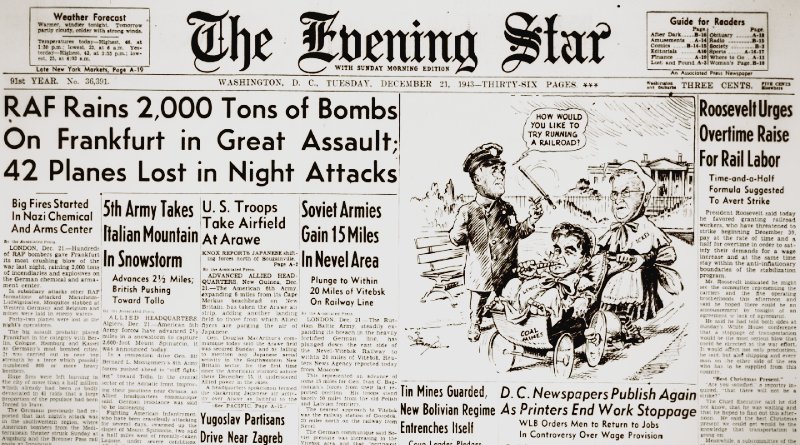World War II Chronicle: December 21, 1943
Click here for TODAY’S NEWSPAPER
Washington politicians are speculating about Gen. Douglas MacArthur possibly accepting a nomination as the Republican presidential candidate… George Fielding Eliot’s column is on page 10… Sports begin on page 16 and the Associated Press once again voted the New York Yankees as professional sports’ top team of the year. In the last 11 years, the Bronx Bombers were named America’s top team six times, but were picked as the biggest disappointment last year.
Roving Reporter by Ernie Pyle
AT THE FRONT LINE IN ITALY — Every morning a medical-aid man makes the rounds of all the gun pits in our battery. He carries a little satchel of bandages and has some instruments hooked to his belt. When he arrived at our pit one day he said:
“Any sick, lame or lazy in this crew today?”
Nobody was sick but they all admitted being lazy.
The only business the medic could drum up was to dole out some cotton for their ears and to paint the crocked fingers of one boy. He carefully spread the vivid purple ointment around the cracked cuticle, and then with a big grin proceeded to paint the entire nail on all ten fingers, as though he were a manicurist.
Despite the dampness in the boy’s fingers are cracking open from the dirt and from washing always in cold water. One of the crew said his fingers had hurt so the night before that he couldn’t sleep.
The medic, incidentally, eats razor blades. He is a farmer from Statesville, N.C., named Pvt. Clarence C. Upright. He says for $25 he’ll eat a double-edged razor blade, wash it down with a glass of water and let you examine his mouth afterwards.
He says he used to do it for less, but since the Italians have raised the price on everything he decided he would also. He tried to get me to buy a performance but I told him I’d wait till I got home again and see it in a carnival for two bits.
One night about eight of our crew were lying or kneeling around a blanket in a big tent playing poker by the light of two candles. Our battery wasn’t firing, but the valley and the mountains all around us were full of the dreadful noise of cannon.
There was a lull in the talk among the players, and then out of the clear sky one of the boys, almost as though talking in his sleep said:
“World war, my friends, is a silly business. War is the craziest thing I ever heard of.”
And another one said also, mainly to himself, “I wish there wasn’t no blankety blank war no more at all.”
Then complete silence, as though nobody had heard. And when words were spoken it was something about the game and no one talked about war. Weird little snatches like that stand out in your mind for a long time.
We were siting in the gun pit one dark morning when word came over the field telephone that a delegation of Russian officers might be around that day on an inspection trip. Whereupon one of the cannoneers said:
“Boy, if they show up in a fighting mood I’m taking out of here. They’re fighters.”
And another one said, “If Uncle Sam ever told me to fight the Russians, I’d put down y gun and go home. I never could fight people who have done what they have.”
The powder charges for our guns come in white sacks about the size of two-pound sugar sacks. Three of them tied together make one charge, and that is the way they arrive in their cases. The type and number of each charge are printed on the bag.
One day the sergeant in calling out his instructions asked for a charge of a certain size. When the powderman brought it, it was only half as big as it should be.
The whole crew gathered around and studied it. They read the printing, and there it was in black and white just as it should be, and yet it was obviously a short charge. So the boys just threw it aside and got another, and that started a long run of conversation and wise cracks along this line:
“Some defense worker who had to work on Sunday made that one,” they’d say. “He was just too tired to fill it up, the poor fellow.”
“If we’d shot that little one the shell would have landed on the battery just ahead.”
“Guess somebody had worked eight hours already that day and made 20 or 30 dollars for it and had to work overtime at time-and-a-half and was just worn out.”
“Or somebody who had to drive all of three or four miles after work to a cocktail bar and he was in too big a hurry to finish this one. It sure is tough on the poor defense workers.”
The boys were more taken with their own humor than by any bitterness. It’s as “Peewee” Graham says:
“You can’t stand around all day with your trap hanging open, so you got to talk about something. And practically anything new for a subject is mighty welcome.”
Evening star. (Washington, D.C.), 21 December 1943. Chronicling America: Historic American Newspapers. Lib. of Congress.
https://chroniclingamerica.loc.gov/lccn/sn83045462/1943-12-21/ed-1/
